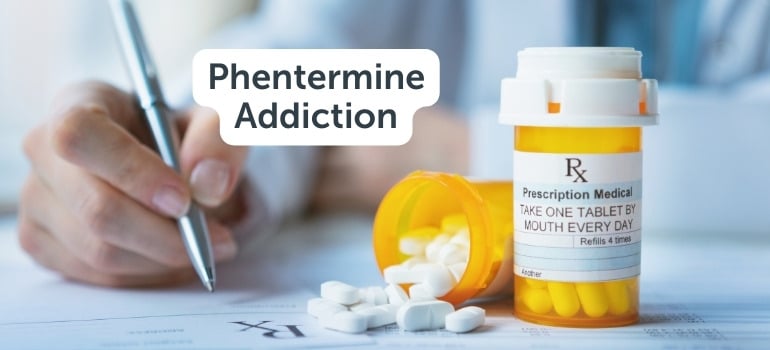Is Phentermine Addictive?
This article is for informational purposes only and should not be used as a substitute for professional medical advice. Always consult your healthcare provider before starting any new medication or supplement regimen.
According to clinical studies, when used as directed, phentermine does not lead to the same levels of addiction or dependence as seen with substances like amphetamines or cocaine.

Too busy for the full read? Here’s what you need to know:
Phentermine is a commonly prescribed medication for weight loss. However, many people wonder whether it can be addictive. This article explores phentermine’s addiction risk based on research findings.
Phentermine: A Brief Overview
Phentermine is a prescription medication that is effective in helping to lose weight. It is recommended for short-term use to help with weight loss, along with diet, exercise, and behavior modification. However, there are concerns about its addictive nature.
Risks of Phentermine Abuse and Dependence
The overall conception is that phentermine carries some risk of abuse and dependence because it affects the same brain regions as amphetamines and cocaine.
Misusing phentermine, such as taking higher doses than prescribed or taking it for longer than necessary, can lead to physical dependence.
Abruptly stopping phentermine use can result in withdrawal symptoms, underscoring the importance of following medical guidance when taking this medication.
Insights from Studies on Phentermine Dependence and Addiction
Several studies have been conducted to understand phentermine’s addictive potential. Two of these studies provide insights into phentermine’s addictive potential and are discussed below.
Phentermine/Topiramate and Dependence or Withdrawal
A 2022 study titled “Phentermine/Topiramate for the Treatment of Adolescent Obesity” investigated the safety of phentermine/topiramate (PHEN/TPM) in adolescents (
Although adverse events were noted in the study, there was no significant evidence of drug abuse, dependence, or withdrawal symptoms.
Psychiatric disorders were reported more frequently in the treatment groups than in the placebo group. Still, no significant differences were observed in mental health assessments.
Long-Term Treatment and Addiction Potential
Another significant study from 2014, “Addiction potential of phentermine prescribed during long-term treatment of obesity,” focused on whether long-term phentermine use leads to abuse, psychological dependence, or drug craving (
The findings showed that none of the long-term phentermine-treated patients showed signs of phentermine abuse or psychological dependence. Furthermore, there was no evidence of drug craving or significant withdrawal symptoms upon cessation, except for an increase in hunger.
The Misconception of Phentermine Addiction
The misconception that phentermine is a highly addictive substance is not entirely true. Clinical evidence suggests that phentermine, when used as prescribed, does not lead to the same levels of addiction or dependence seen with other substances like amphetamines or cocaine.
The confusion likely stems from its classification and mechanisms of action, which are similar to those of known addictive substances.
However, recognizing the distinction between potential abuse in cases of misuse and addiction under medically supervised use is crucial for a balanced understanding of phentermine’s role in weight loss.
Managing Weight Loss: Phentermine and Alternatives
While phentermine can be an effective part of a weight loss strategy, it’s essential to approach it as one component of a comprehensive plan that includes dietary changes, physical activity, and behavioral modifications.
A Balanced Approach to Weight Loss
Effective weight loss is not solely about medication. A holistic approach, incorporating healthy eating habits, regular exercise, and positive lifestyle changes, is crucial for sustainable weight loss.
Exploring Alternatives: PhenQ
PhenQ offers a viable solution for those hesitant about using phentermine or seeking a natural alternative. This natural weight loss supplement aims to provide similar benefits without the side effects associated with phentermine.
Conclusion: Making an Informed Decision
Choosing a weight loss solution, such as phentermine, should be done after carefully considering all aspects of your health and weight loss goals. Consult healthcare professionals, examine all options, and make an informed decision.
- Kelly, A., Bensignor, M. O., Hsia, D., Shoemaker, A. H., Shih, W., Peterson, C., & Varghese, S. (2022). Phentermine/Topiramate for the Treatment of Adolescent Obesity. Retrieved April 30, 2022, from https://dx.doi.org/10.1056/evidoa2200014
- Hendricks, E. J., Srisurapanont, M., Schmidt, S. L., Haggard, M., Souter, S., Mitchell, C. L., De Marco, D. G., Hendricks, M. J., Istratiy, Y., & Greenway, F. L. (2014). Addiction potential of phentermine prescribed during long-term treatment of obesity. International journal of obesity (2005), 38(2), 292–298. https://doi.org/10.1038/ijo.2013.74
